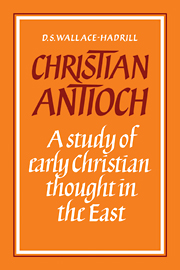Book contents
- Frontmatter
- Contents
- Foreword
- Abbreviations
- Introduction: survey of the history of Antioch
- 1 The religious background to Antiochene Christianity: pagan, Jewish, gnostic
- 2 The interpretation of the biblical record
- 3 Historiography in the Eastern Church
- 4 The doctrine of the nature of God
- 5 The use of Greek philosophy by the Eastern Church
- 6 The human experience of Christ and the salvation of man
- 7 Antiochene theology and the religious life
- Appendix 1 Eastern representation at Nicaea
- Appendix 2 The feminine element in Syrian Christianity
- Notes
- Bibliography
- Index
3 - Historiography in the Eastern Church
Published online by Cambridge University Press: 03 May 2010
- Frontmatter
- Contents
- Foreword
- Abbreviations
- Introduction: survey of the history of Antioch
- 1 The religious background to Antiochene Christianity: pagan, Jewish, gnostic
- 2 The interpretation of the biblical record
- 3 Historiography in the Eastern Church
- 4 The doctrine of the nature of God
- 5 The use of Greek philosophy by the Eastern Church
- 6 The human experience of Christ and the salvation of man
- 7 Antiochene theology and the religious life
- Appendix 1 Eastern representation at Nicaea
- Appendix 2 The feminine element in Syrian Christianity
- Notes
- Bibliography
- Index
Summary
While all religions are in a sense historical religions, the claim of Christianity to be a historical religion takes its stand upon doctrinal ground rather different from that of any other of the major religions, in that it claims that the historical person of Christ is of cosmic significance. Christ is seen as central to the proper understanding of the world in which he is incarnate and, although the articulation of this central significance of Christ varies as Christian doctrine changes its emphasis over centuries, and even within the patristic era itself, the claim for Christ's centrality remains, whether his significance is seen in relation to the objects and processes of the natural world or to the events of human history. Patristic historiography must be seen in the wider context of the religious and philosophical standpoint of its writers. It does not fall within the scope of this chapter to examine the Alexandrian view of human history, but such an undertaking would need to set the matter in the framework of the Platonist spirituality of Philo and Origen. Eusebius lies nearer to our purpose, for all Antiochene and Syrian historical writing is to some degree beholden to him, and we must pay attention to his vision of human history as having achieved its goal in the Christian empire. We shall also need to note the philosophical and doctrinal basis of Theodore's view of man and his development.
- Type
- Chapter
- Information
- Christian AntiochA Study of Early Christian Thought in the East, pp. 52 - 66Publisher: Cambridge University PressPrint publication year: 1982

